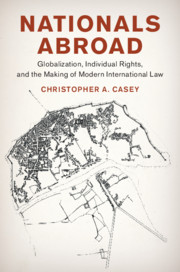Book contents
- Frontmatter
- Dedication
- Contents
- Acknowledgments
- Abbreviations
- Introduction
- Part I Mise-en-scène: The International Legal World, 1850–1914
- Part II Mise-en-scène: The International Legal World, 1919–1939
- Part III Mise-en-scène: The International Legal World, 1945–Present
- 6 Cosmopolitans and Capitalists
- Conclusion
- Notes
- Index
Conclusion
from Part III - Mise-en-scène: The International Legal World, 1945–Present
Published online by Cambridge University Press: 29 June 2020
- Frontmatter
- Dedication
- Contents
- Acknowledgments
- Abbreviations
- Introduction
- Part I Mise-en-scène: The International Legal World, 1850–1914
- Part II Mise-en-scène: The International Legal World, 1919–1939
- Part III Mise-en-scène: The International Legal World, 1945–Present
- 6 Cosmopolitans and Capitalists
- Conclusion
- Notes
- Index
Summary
People still move, states still don’t. In the eighteenth and nineteenth centuries, the states of the Atlantic world dealt with that fact through the legal formalization of protection abroad. But that system proved difficult at a time when incipient nationalism demanded that spaces of identity conform to spaces of politics. It was simply too dangerous for states to be active claimants on the literal and metaphorical bodies of their real and fictive nationals abroad. Beginning in the 1920s and accelerating in the decades after 1945, an individualist paradigm emerged in force. Individuals, it was thought, should be able to stand before international tribunals and have their rights protected by the international order and, importantly, nationality should no longer be determinative of the kinds of protection persons, real or fictive, receive. Refugees should not be determined based upon their nationality, but rather their individual well-founded fear of persecution. Investors should not receive greater protection because they were British or French or American with the political power such nationality could mobilize.
- Type
- Chapter
- Information
- Nationals AbroadGlobalization, Individual Rights, and the Making of Modern International Law, pp. 192 - 198Publisher: Cambridge University PressPrint publication year: 2020



